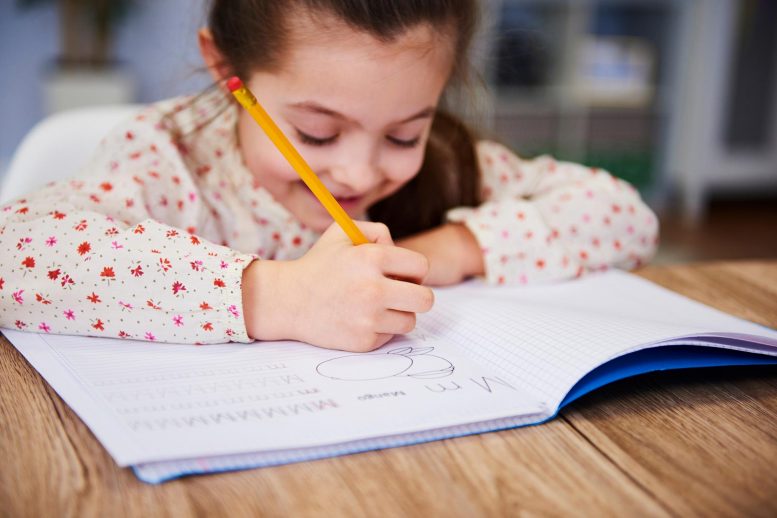
Reevaluating Handwriting in a Digital World
Though writing by hand is increasingly being eclipsed by the ease of computers, a new study finds we shouldn’t be so quick to throw away the pencils and paper: handwriting helps people learn certain skills surprisingly faster and significantly better than learning the same material through typing or watching videos.
“The question out there for parents and educators is why should our kids spend any time doing handwriting,” says senior author Brenda Rapp, a Johns Hopkins University professor of cognitive science. “Obviously, you’re going to be a better hand-writer if you practice it. But since people are handwriting less then maybe who cares? The real question is: Are there other benefits to handwriting that have to do with reading, spelling, and understanding? We find there most definitely are.”
The work appears in the journal Psychological Science.
Rapp and lead author Robert Wiley, a former Johns Hopkins University Ph.D. student who is now a professor at the University of North Carolina, Greensboro, conducted an experiment in which 42 people were taught the Arabic alphabet, split into three groups of learners: writers, typers and video watchers.
Everyone learned the letters one at a time by watching videos of them being written along with hearing names and sounds. After being introduced to each letter, the three groups would attempt to learn what they just saw and heard in different ways. The video group got an on-screen flash of a letter and had to say if it was the same letter they’d just seen. The typers would have to find the letter on the keyboard. The writers had to copy the letter with pen and paper.
At the end, after as many as six sessions, everyone could recognize the letters and made few mistakes when tested. But the writing group reached this level of proficiency faster than the other groups – a few of them in just two sessions.
Next the researchers wanted to determine to what extent, if at all, the groups could generalize this new knowledge. In other words, they could all recognize the letters, but could anyone really use them like a pro, by writing with them, using them to spell new words and using them to read unfamiliar words?
The writing group was better – decisively – in all of those things.
“The main lesson is that even though they were all good at recognizing letters, the writing training was the best at every other measure. And they required less time to get there,” Wiley said.
Handwriting Reinforces Learning Multisensory Connections
The writing group ended up with more of the skills needed for expert adult-level reading and spelling. Wiley and Rapp say it’s because handwriting reinforces the visual and aural lessons. The advantage has nothing to do with penmanship – it’s that the simple act of writing by hand provides a perceptual-motor experience that unifies what is being learned about the letters (their shapes, their sounds, and their motor plans), which in turn creates richer knowledge and fuller, true learning, the team says.
“With writing, you’re getting a stronger representation in your mind that lets you scaffold toward these other types of tasks that don’t in any way involve handwriting,” Wiley said.
Although the participants in the study were adults, Wiley and Rapp expect they’d see the same results in children. The findings have implications for classrooms, where pencils and notebooks have taken a backseat in recent years to tablets and laptops, and teaching cursive handwriting is all but extinct.
The findings also suggest that adults trying to learn a language with a different alphabet should supplement what they’re learning through apps or tapes with good old-fashioned paperwork.
Wiley, for one, is making sure the kids in his life are stocked up on writing supplies.
“I have three nieces and a nephew right now and my siblings ask me should we get them crayons and pens? I say yes, let them just play with the letters and start writing them and write them all the time. I bought them all finger paint for Christmas and told them let’s do letters.”
Reference: “The Effects of Handwriting Experience on Literacy Learning” by Robert W. Wiley and Brenda Rapp, 29 June 2021, Psychological Science.
DOI: 10.1177/0956797621993111
The work was supported by the Science of Learning Institute at Johns Hopkins University, and the Dingwall Foundation Dissertation Fellowship in the Cognitive, Clinical, and Neural Foundations of Language.
Never miss a breakthrough: Join the SciTechDaily newsletter.
3 Comments
super! I want to advise you to pay attention to dissertation help online https://www.edugeeksclub.com/dissertation/ – specialists from the online service will cope with any topic of written work for you, in the shortest possible time, without plagiarism and using real authoritative sources and not just downloaded from the Internet
really great
Thanks you for the post